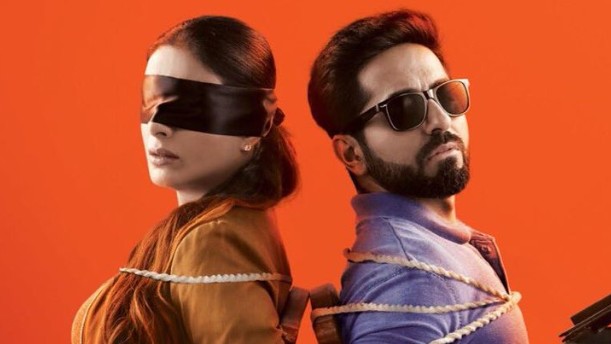In Sriram Raghavan’s immoral universe, there are clearly defined good people and even more clearly defined bad people. Bad things happen to good people and good things happen to bad people. Sometimes, good people do bad things, suggesting they aren’t so good after all and at other times, bad people do good things, only to pay for it with their lives. Sometimes, they pay even when they haven’t done anything. Karma here is all topsy turvy and especially delicious for that.
Sriram Raghavan’s latest thriller, Andhadhun is inspired by a French short film, l’Accordeur (The Piano Tuner) directed by Olivier Treiner and influenced by Francois Truffaut’s iconic, Shoot the Piano Player; the latter happened to be the working title of the film as well. Raghavan takes events from one and language from the other and mixes them with his whimsical and imaginative cheekiness to give us a film uniquely distinct in content, tone, style and after-effects.
Play of Contrasts
According to David Ehrenstein, ‘What makes Shoot the Piano Player so successful is… its masterful mixture of different dramatic tones.’ The same is true of Andhadhun. The film turns the corner of different dramatic tones so rapidly that it becomes a vibrant exercise to follow through its dark hilarity, hilarious darkness and some romantic tenderness. The film is silly and smart at the same time, sweet and sour at the same, warm and cold at the same time while constantly obfuscating the truth through innocuous innuendos that draw out these amusing contrasts, tumbling out in rapid succession like the dark secrets of the film itself.
The mock serious tone of the film pitches its cold-blooded, decisive and soul-less femme fatale Simi against the mushy, indecisive Hamlet (passing mention), against the guilt-ridden Lady Macbeth (pointed mention) and even the innocent, heartbroken Nurse Radha (presumably a reference drawn from Waheeda Rahman’s character in Khamoshi), who in Simi’s imagination runs away from the nursing home, all with a chuckle. It takes a classic, Teri Galiyon Mein and merrily turns it into a hundred things it is not.
It takes Beethoven’s 5th symphony and puts it into a Bollywood crime thriller, packing a powerful punch in an already punchy scene. It takes its convoluted plot and turns it into a tragi-comic mime scene complete with a grand piano piece, a scene that seems right out of a Keaton or Chaplin film. It is endless, the things the film turns on its head and comes out grinning from ear-to-ear, chuckling at its own temerity.
Solid, Fluid Performances
It doesn’t let you sit still, but it’s not a mere joyride, it’s more like white water rafting – up and down, down and up. This shape-shifting tone of the film, its unique charm, perhaps would have been less than itself without the pitch-perfect performances of the entire cast, from the primary to the tertiary.
Ayushman Khurana’s confident blind man turns into a frantic one ever-so smoothly even as we witness Radhika Apte’s naive Sophie losing her innocence but not her gullibility. The notes Tabu strikes with her cold, mercurial yet likeable Simi suggests the joy she may have got in sinking her teeth into a role fulfilling her giant mettle.
Manav Vij’s bulky, hulky policeman, so easily bullied by his women and the excellent Ashwini Kalsekar as his wife, deserve a separate film on their own. The trio of Zakir Hussain’s Dr Swamy, Chhaya Kadam’s Manushi and the actor playing Murli complete the madness with their own brand of sweet mayhem. But perhaps, the most charming is Anil Dhawan as a good-hearted, has-been Bollywood star and the heart with which he delivers his role.
Love For the Medium
Kent Jones, said about Shoot The Piano Player, ‘The film offers powerful evidence of his (Truffaut’s) love of American cinema and literature’. If life depends on the liver, Andhadhun’s liver is its love for the medium. It shows in the carefully constructed plot that threatens to go haywire but just about does not, operatic crescendos petering into mundane silliness, constant shifting of lens, base, mood and tone, and the generous use of music, both Hindi and Western.
It states its allegiance to Chhayageet/Chitrahaar personified as people now no more, and soon enough rushes into noir territory, only to keep jumping back and forth, straddling both worlds with perfection.
Kent Jones goes on to add, ‘Shoot the Piano Player is never grim. It may show us the dark underside of city life, but it is somehow quite unsordid. Daring to make us laugh at people in decidedly unfunny circumstances, the film manages to catch that laughter in mid-air and overlay it with a sense of sadness—without killing the joke.’ It’s almost as though he is speaking of Andhadhun.
(At The Quint, we question everything. Play an active role in shaping our journalism by becoming a member today.)
